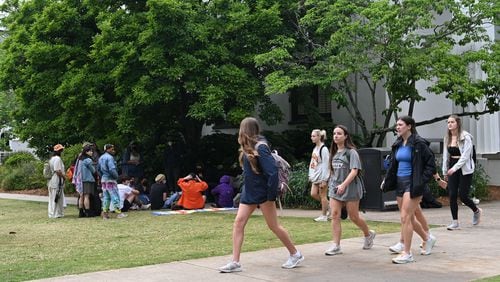As leaders of colleges and universities in Georgia attempt to pivot to final exams and commencement ceremonies, the responses to Israel-Hamas war protests on some campuses remained at the center of debate Tuesday.
While students at the University of Georgia and Emory University are protesting with common goals, the response from administrators on each campus is like night and day.
More than a dozen people, most of them students, face possible charges after a Monday demonstration at UGA, the state’s flagship public university. Multiple students were suspended, protesters told The Atlanta Journal-Constitution Tuesday; the university declined to confirm or comment.
Meanwhile at Emory’s Atlanta campus, at least one of the protesters arrested Thursday was reassured by the dean of students that she would not face conduct charges or be barred from campus. Demonstrations were dwindling Tuesday at UGA, but slated to continue Tuesday evening at Emory, the state’s largest private university.
The differing tones reflected the differing approaches colleges across the country have taken as students call for the institutions to cut financial ties to Israel. Some Columbia University students smashed windows and barricaded a building weeks into an encampment. The University of Florida threatened to suspend students and fire faculty members if their protest actions violated campus safety policies and later put out a statement saying, “The University of Florida is not a day care.”
As Georgia schools face scrutiny over their response to protesters, University System of Georgia Chancellor Sonny Perdue defended UGA’s actions.
“If students are preventing their classmates from getting their education, then they are trespassing,” Perdue said in an interview Tuesday with the AJC.
Perdue said the University System, which oversees operations at UGA and 25 other colleges and universities, has guidelines on disruptive behavior. The policy states students determined to be involved in activities that disrupt activity at any of their schools are subject to disciplinary procedures, “possibly resulting in academic dismissal or termination of employment.”
UGA remains “firmly committed” to freedom of speech and expression but that it also has the right “to regulate the time, place and manner” of protests, it said in a statement Monday. But protesters Tuesday had a hard time finding a place to demonstrate. Administrators told them they couldn’t protest on the Old College lawn, the scene of Monday’s protest, without submitting paperwork. After relocating to Tate Plaza, the main student center and a designated area for “expressive activity,” administrators said they couldn’t protest inside the center or under a nearby covered walkway after it started raining.
Perdue, a former two-term governor, said there are no plans to make any changes to the commencement schedule for any of its schools. The chancellor said there are discussions about additional security for University System schools that are planning off-campus commencement ceremonies. Ceremonies are scheduled to begin Wednesday at Georgia State University and this weekend at Clayton State University and Georgia Tech.
Students from the Savannah College of Art & Design’s Atlanta campus are planning a walkout Wednesday morning in solidarity with protesters on other campuses.
Earlier Tuesday, a group of multifaith leaders held a press conference echoing the goals and calls to action of both Emory students and students at other universities: Cut financial ties with Israel and the Atlanta public safety training center; stop violence against protesters and drop charges against students who were arrested; and urge President Joe Biden not to speak at the Morehouse College commencement.
Credit: AP
Credit: AP
“I want to be clear: As long as Emory prefers brutalizing students over divesting from genocide and Cop City, we will continue in our actions,” said Daniella Hobbs, a Candler School of Theology student.
Of the 23 people who were booked into the DeKalb County Jail after Thursday’s demonstration, 15 were students.
Students and other protesters may have good intentions when gathering on a campus quad to support a cause, but Atlanta criminal defense attorney Andrew Fleischman said they need to be familiar with legal ramifications beforehand. For example, are you allowed to be in the space where the protest is happening?
“If you’re in a private space and somebody tells you to leave, you’ve got to go,” said Fleishman, a partner at Sessions & Fleischman, LLC. “So if you’re a private campus, like Emory, and someone says, ‘You can’t be here,’ at that point police can eject you.”
Fleischman has defended well-known clients like Nydia Tisdale, an independent journalist who was arrested several years ago for filming a Republican rally on private property. The property owner gave Tisdale permission to film, but changed his mind unbeknownst to her. She was asked to leave but refused.
“Ultimately, (the court of appeals) said it was okay to arrest her for that,” Fleischman said.
He said slightly different rules apply to public spaces, like the University of Georgia.
“If you’re in a public space — you’re in the square, you’re in the quad — and you are not actively disrupting people, you’re not forbidding them entry or blocking them, that’s protected,” he said.
Blocking someone’s entry to a building, though, could be a crime, he said. So could touching a police officer.
“If you touch someone in a way that’s disagreeable to them, that’s a battery,” he explained. “If there’s any element of violence, if you’re offering violence in any way, which can be as little as taking a ‘fighting stance,’ that’s felony obstruction.
Staff writers Tia Mitchell and Eric Stirgus contributed to this report.










